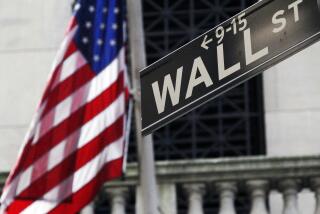International Business : Analysts Forecast Better Times for Japanese Stocks--Next Year : Markets: The Nikkei hit a nine-month low this week, but the economy is finally improving.
- Share via
TOKYO — For investors in Japanese stocks, brokers and analysts here are singing a familiar tune: Things will stay bad for the next couple of months, but wait for better times next year.
Skeptics will remember the tune from earlier this year, last year and the year before that.
But this time it’s for real, because Japan’s economy is finally recovering and stock markets overseas look much less appealing than Japan’s, brokers and analysts say, even though the Nikkei average recently ended at a nine-month low.
“It’s not a terribly good end to the year,” said Jason James, strategist at James Capel Pacific in Tokyo.
“It seems to be ending with a whimper rather than a bang,” James said after the bellwether Nikkei average ended Tuesday at a nine-month low, down 158.73 points at 18,962.99.
The market was closed Wednesday because of a public holiday.
On Tuesday, Japanese stocks fell largely because of the weakness of markets in New York overnight.
But selling pressure is likely to remain until the end of the year, when big foreign investors sell to boost stocks’ performance before they calculate how they have done over the year.
Over the next couple of months, there is also likely to be heavy selling from investors who bought on credit, or margin, in June and July when the Tokyo market boomed.
The mainly individual investors who bought then are now being asked to pay the outstanding balance for their shares.
But most are closing their positions at a loss because the market is weaker now than it was when they bought.
Before selling by foreigners and individuals subsides at the end of this year or the start of next, brokers and analysts say, the Nikkei could fall as low as 18,000.
“There’s only another 900 points to go to 18,000, so we could reach that before the end of the year,” said longtime bull Yasuo Ueki, general manager at Nikko Securities in Tokyo.
Even if the Nikkei hits 18,000, it would still be way above its 1993 low of 16,078.71, reached Nov. 29.
After the short-term pressures are out of the way, however, share prices in Tokyo should start to climb, though few expect anything spectacular.
“Quite a lot of foreigners are tipping Japan for next year,” and that should lift the market out of its current gloom, said Tim Hayashida, strategist at Merrill Lynch Japan Inc. in Tokyo.
“Over the medium term, there are some people increasing weightings here because they hate the rest of the world,” said James of James Capel.
Hayashida and James said foreign investors remain bullish on Japan partly because New York, London and many of Southeast Asia’s stock markets look vulnerable as their growth starts to slow.
At the same time, Japan’s economy is just starting to get going after a 3 1/2-year recession dubbed by many as Japan’s toughest since the end of World War II.
“Looking at interim results, they are higher than I expected, and I think that my expectations were higher than average,” said James, who believes that these earnings reflect a stronger economic recovery than recent statistics suggest.
Corporate earnings are likely to continue recovering in 1995, but James said rising bond yields will deter many investors from buying shares aggressively, ruling out sharp share price rises until perhaps as late as this time next year.
“I think that with bond yields where they are now, you have to be pretty convinced that there is pretty strong earnings growth for at least two years” to buy stocks, James said, because current returns on bonds look attractive to many investors.
Nikko’s Ueki disagreed, saying he expects a big influx of foreign money to boost prices as early as January, when the Nikkei is likely to start a rally.
More to Read
Inside the business of entertainment
The Wide Shot brings you news, analysis and insights on everything from streaming wars to production — and what it all means for the future.
You may occasionally receive promotional content from the Los Angeles Times.










